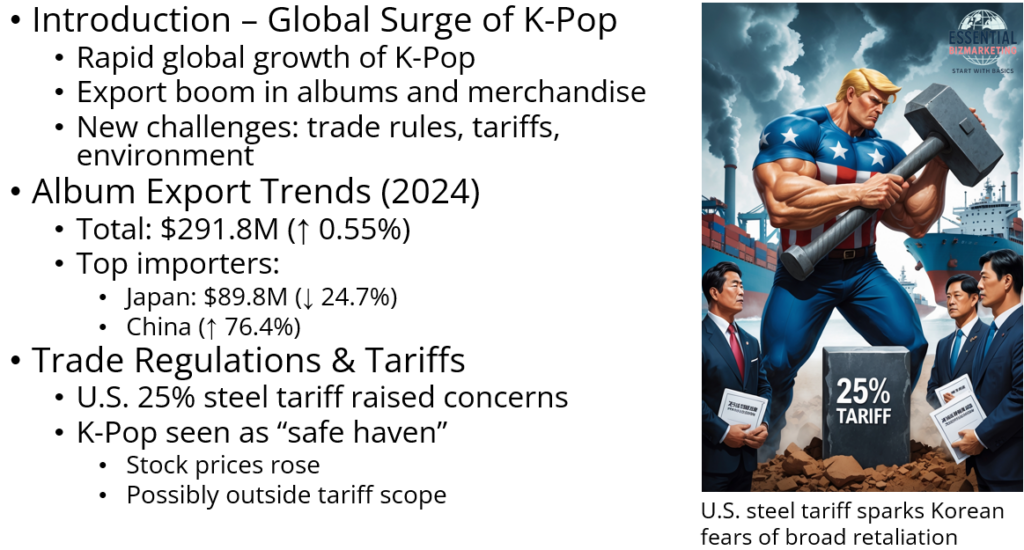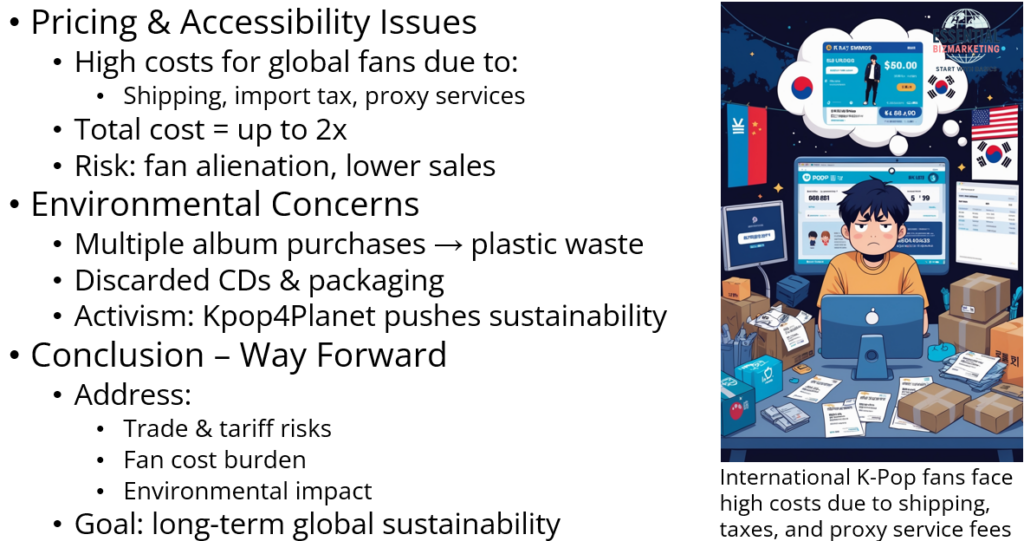Introduction: The Global Surge of K-Pop

The K-Pop industry has experienced a remarkable global expansion, leading to significant increases in the export of albums and merchandise. This international growth, while beneficial economically, has introduced challenges related to trade regulations, tariffs, and environmental concerns.
Increase in K-Pop Album Exports
In 2024, the monetary value of K-Pop album exports reached approximately USD $291.8 million, marking a modest 0.55% year-over-year increase. Japan emerged as the largest importer, accounting for $89.8 million, followed by the United States and China. Notably, exports to China surged by 76.4%, whereas exports to Japan declined by 24.7% during the same period.
Impact of Trade Regulations and Tariffs
The imposition of tariffs can significantly affect the global distribution of K-Pop products. For instance, the 25% tariff on foreign steel imposed by the U.S. in 2025 raised concerns among South Korean officials about potential retaliatory measures impacting various sectors. Interestingly, during this period, investors viewed K-Pop as a “safe haven,” leading to a surge in entertainment stock prices. This suggests that, despite broader trade tensions, the entertainment sector remained resilient, possibly due to its classification outside traditional goods subject to tariffs.
Challenges in Merchandise Pricing and Accessibility

International fans often face high costs when purchasing K-Pop merchandise due to elevated shipping fees, import taxes, and the necessity of using proxy services for certain platforms. These additional expenses can double the original price of items, potentially alienating segments of the global fanbase and impacting international sales.
Environmental Concerns Related to Physical Albums
The surge in K-Pop album sales has led to environmental issues, particularly concerning plastic waste. Fans frequently purchase multiple copies of the same album to obtain limited-edition items, resulting in discarded CDs and packaging. Activist groups like Kpop4Planet have emerged, advocating for the industry to adopt more sustainable practices and reduce plastic production.
Conclusion: Navigating Global Trade Dynamics
As K-Pop continues its global ascent, addressing trade regulations, tariff implications, and environmental concerns becomes imperative. Implementing strategies to mitigate additional costs for international fans and adopting sustainable production practices will be crucial for the industry’s sustained success in the international market.
📚 References
Music Business Worldwide. (2025, February 12). K-Pop in crisis? Around 93m albums were sold in South Korea in 2024. https://www.musicbusinessworldwide.com/k-pop-in-crisis-around-93m-albums-were-sold-in-south-korea-in-2024-23m-fewer-than-in-2023/
The Guardian. (2025, February 12). Going for a song: investors flee to K-pop as safe haven amid Trump’s tariff war. https://www.theguardian.com/music/2025/feb/12/donald-trump-tariffs-k-pop-group-investments-soar-stock-market-safe-haven
Reddit. (2025, January 15). Why are K-pop merch prices so high? Is it alienating international fans?. https://www.reddit.com/r/kpopthoughts/comments/1hutq0v/why_are_kpop_merch_prices_so_high_is_it/
Inquirer Plus. (2024, December 2). K-pop fans take aim at CD, merchandise waste. https://plus.inquirer.net/news/k-pop-fans-take-aim-at-cd-merchandise-waste/
📁 Start exploring the Blog
📘 Or learn more About this site
🧵 Or follow along on X (Twitter)
🔎 Looking for sharp perspectives on global trade and markets?
I recommend @GONOGO_Korea as a resource I trust and regularly learn from.
